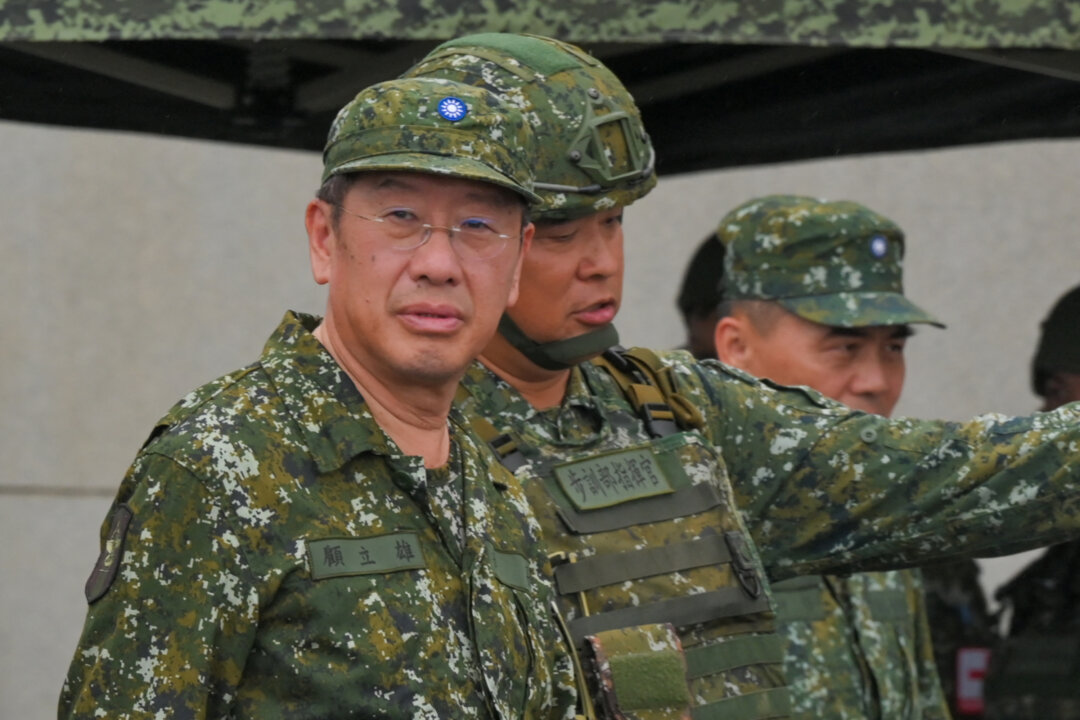TAIPEI—China’s communist regime would be committing an act of war should it decide to impose a blockade on Taiwan, Taipei’s Defense Minister Wellington Koo warned on Oct. 23, a week after the regime held military drills that encircled the island.
Speaking to reporters at Taiwan’s Legislature, Koo was asked about China’s recent military drills, which the Chinese military dubbed “Joint Sword-2024B.” During the one-day exercise on Oct. 14, Chinese aircraft and vessels engaged in drills that included a blockade of key ports and areas.
Koo said that while the drills delineated the exercise area, there were no designated no-flight or no-sail zones.
Under international law, a blockade would prohibit aircraft and ships from entering an area, Koo added.
“Then, according to United Nations resolutions, it is regarded as a form of war,” he said.
“I want to stress that drills and exercises are totally different from a blockade, as would be the impact on the international community.”
The Chinese Communist Party (CCP) considers Taiwan part of its territory and has threatened to use military force to seize the island. In 2023, the Pentagon warned that China could potentially force Taiwan to surrender by imposing a blockade against the island, with concurrent electronic warfare, network attacks, and information operations.
Koo said that a blockade against Taiwan would affect the global economy, noting that one-fifth of global freight, or approximately $2.5 trillion of goods, passes through the Taiwan Strait, a narrow body of water separating China and Taiwan.
“The international community could not sit by and just watch,” he said.
Taiwan has been outlining its preparations in case of a blockade, but Koo noted that the island’s dependence on imported liquefied natural gas could be a weak point.
The Center for Strategic and International Studies (CSIS) said in an August report that Taiwan’s dependence on imports—about 97 percent of its energy and about 70 percent of its food—makes the island vulnerable to a potential China blockade.
Taiwan’s stockpiles of coal, crude oil, and food could be subjected to Chinese bombardment during a blockade, thus “reducing Taiwan’s ability to resist,” according to the report.
“China does not need to hermetically seal off Taiwan to achieve its goals,” the report says. “Curtailing trade into Taiwan by even 50 percent would prove detrimental for Taiwan, especially if Beijing stops all or most imports of oil, natural gas, and coal, which would eventually cause progressive failures in electric power distribution around the island.”
The Chinese military’s coercion against Taiwan has not stopped following the Oct. 14 military drills.
On Wednesday morning, Taiwan’s defense ministry announced that it had spotted a Chinese navy fleet, led by the Liaoning aircraft carrier, sailing north through the Taiwan Strait from the vicinity of Taipei-administered Pratas Islands, which are located in the northern part of the South China Sea.
On Monday, China’s Maritime Safety Administration issued a notice saying that an area around Niushan Island in southern China’s Fujian Province would be closed off from 9 a.m. to 1 p.m. local time the next day for live fire drills.
In response, Taiwan’s defense ministry called the live drills part of “routine” Chinese training.
Secretary of the Air Force Frank Kendall, in a keynote address at an Air & Space Forces Association convention in September, discussed threats posed by the Chinese regime against the United States and Taiwan.
“China is moving toward larger and more sophisticated exercises, generally oriented on an invasion or blockade of Taiwan,” Kendall said. “I am not saying war in the Pacific is imminent or inevitable … [but] the likelihood is increasing and will continue to do so. China’s building a military with a purpose to seize Taiwan and defeat the United States and its partners.
“[CCP leader] Xi Jinping has told his military to be ready by 2027. We don’t know his intent, but there is no question that China is preparing for conflict with the United States. To prevent conflict, we must be ready. To prevail in conflict, we must be ready.”
Reuters contributed to this report.

